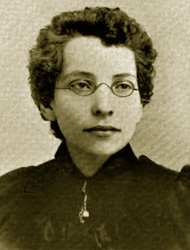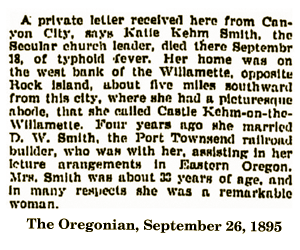James Edward Hughes, Blue Grass Blade — August 16, 1908
 With the subject of this sketch we can truly say that it is indeed a calamity that the delicious manuscript of youth should be brought to a sudden and early close. But for the Interference of the grim reaper with a young brilliant and useful life none can predict what rood might have been accomplished for the cause of Liberalism on the golden shores of the far Pacific.
With the subject of this sketch we can truly say that it is indeed a calamity that the delicious manuscript of youth should be brought to a sudden and early close. But for the Interference of the grim reaper with a young brilliant and useful life none can predict what rood might have been accomplished for the cause of Liberalism on the golden shores of the far Pacific.
Katie Kehm Smith during her active career as Freethought propagandist was probably the youngest Freethought advocate in America but with her youth, came a beauty of grace and gentleness that constituted a peculiar and singular charm characteristic of the woman of her work and her very nature. Earnestness of purpose and deep sincerity of effort marked the course of her life and those who knew her and worked with her came to love her for her mental and moral worth greatest of all factors in solving the complex problems that beset human Society Active and energetic she never faltered. In the course of her brief but brilliant career and the Freethinkers of America do honor to themselves by honoring this sublime character.
Katie Kehm was born at Warsaw, Illinois in the fall of 1868. She was given a fairly good education by admiring parents such as the common public schools of that period could afford and her inclination leaning towards pedagogy, she became a teacher in the schools of her immediate district duly qualifying therefor at the age of but seventeen years. To acquire the necessary art to perform this great duty, she attended a college at Ottumwa, Iowa from which she graduated with high honors in 1885. School teaching now became her chosen profession but with it all there appeared a strong vein of liberalism in her work, which was a decided departure from the prevalent customs of the age in which she lived and taught. Before taking up her work as a school teacher, she had become a convert to Freethought a mental plane acquired by her own effort brought about by close study and effective reasoning. She was in all things an observant student, and her contact with the people revealed to her susceptible mind the wrongs that were being perpetrated upon them in the name of religion, and she resolved, as opportunity came to her, to strive to remedy these wrongs as far as she was able so to do.
At the age of seventeen years she had given her first Freethought lecture. Bible believers opposed and criticized her. This did not check her, but on the contrary she fought them at every stage and with tremendous success. She soon turned her attention to the great west and was found next In Oregon where she prosecuted her Freethought work with unabated hope renewed vigor. The great liberal spirit of the west was more in accord with her own mind and she found an abundance of sympathy and help for the cause she was advocating.
In 1891 we find her in Port Townsend Washington where she met and married Hon D. W. Smith an eminent lawyer and a stanch Freethinker. Mrs. Smith still carried her maiden name before her married name, and in this way she maintained individuality and identity. She found a noble companion in her husband. Judge Smith gave all possible aid to this brilliant young advocate of Liberal philosophy. Together they conceived the plan of educating the youth and childhood of the far west in Liberal ideas and through their joint efforts the First Secular Church of Portland Oregon with a Secular Sunday School attached was brought into active existence. Mrs. Smith still aided by her husband conducted both church and school and it grew to large proportions under their joint care and management. The Oregon Secular Union soon came into existence and under its auspices Mr. and Mrs. Smith established a circuit of Secular Sunday schools placing competent teachers in charge they retaining supervision over the work.
Mrs. Smith lectured for the Portland Secular Church every Sunday and she was invariably favored with a large and enthusiastic audience. From her brain and pen came the Sunday lessons printed on small leaflets for use by the attendant children. Her talents were devoted exclusively to the cause of Liberalism. In recognition of her great ability she was made Secretary of the Oregon State Secular Union and the Blade’s editor had the pleasure of meeting with both of these sturdy workers at one of the annual conventions of that body held at Salem the Oregon State Capital In the spring of 1892. Later Mr. and Mrs. Smith attended one of our lectures at Barlow Oregon and Mrs. Smith took part In the proceedings.
While thus engaged Judge Smith having the means at command purchased a beautiful home on the Willamette River. Mrs. Smith at once playfully named it Castle Kehm on the Willamette and her husband falling in with the idea suggested, adopted the name she had given it and for some years thereafter it was so known. The home was situated on a lofty crag by the side of the river from which a splendid view could be obtained of the surrounding country.
 But work will tell. The excessive studies she indulged in the constant volume of the work she was undertaking soon had its effect upon her youthful frame. She sickened and died. She had made frequent contributions to the Freethought press of the country. Her lecture appointments her church work and Sunday school labors her efforts to build up the State organization the care of a circuit of such Sunday schools began to wear upon the physical strength of this small frame—this bundle of womanly energy and nerve—that she was unable to survive the shock and after a brief but severe illness she passed away attended by loving hearts in her beautiful Oregon home.
But work will tell. The excessive studies she indulged in the constant volume of the work she was undertaking soon had its effect upon her youthful frame. She sickened and died. She had made frequent contributions to the Freethought press of the country. Her lecture appointments her church work and Sunday school labors her efforts to build up the State organization the care of a circuit of such Sunday schools began to wear upon the physical strength of this small frame—this bundle of womanly energy and nerve—that she was unable to survive the shock and after a brief but severe illness she passed away attended by loving hearts in her beautiful Oregon home.
While sad was the blow to her loving husband, the blow was greater to the cause of Free thought. The splendid work she had done soon fell back into quietude and disuse. It was now evident that it was her work and charm that kept the movement alive. There were other workers and other speakers in the far west but they were not Katie Kehm Smith, and in her death rationalism lost an Invaluable ally and worker.
But Kate Kehm Smith did not live in vain. The seeds she had succeeded in planting in youthful hearts fructified and grew and brought forth good fruit. Why was it necessary for her to die so young, in the hey-day of a youthful glory and unsullied career? Yet it is not for us to determine. Could our cause boast one hundred such women today the god myth and Christian superstition would no longer enthrall the mind of humanity. Glory to her name. Honor to her memory. Katie Kehm Smith is dead but her works still live and in this she has won an immortality that cannot be obtained by faith.

